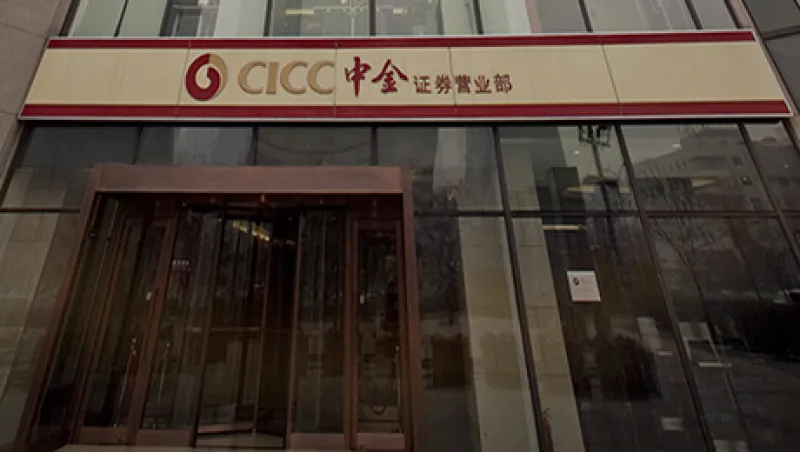China International Capital Corp., the pioneering investment bank that brought many of the country’s financial institutions to the market in the 2000s, finally hit the jackpot itself by successfully listing its shares in Hong Kong this week. The bank raised $811 million with its initial public offering, a deal that reopened the market for Chinese IPOs after a five-month freeze imposed by the authorities in Beijing because of the stock market’s recent collapse.
Since the stock market crash this summer, Chinese regulators have launched a series of investigations into alleged market manipulation and what the government calls “malicious short-selling,” hauling in senior executives from several investment banks, including three senior executives of CITIC Securities Co., China’s largest brokerage house.
CICC executives haven’t been touched by the crackdown, though. It doesn’t hurt that its chairman, Ding Xuedong, is also chairman and CEO of China Investment Corp. (CIC), the country’s $747 billion sovereign wealth fund, and is a former Finance vice minister known to be close to senior aides to President Xi Jinping. He succeeded Jin Liqun, who left his post as CICC chairman last year to become head of the Asian Infrastructure Investment Bank, Beijing’s $50 investment vehicle for Asia-wide development. So, in many ways, CICC was an ideal candidate to reopen the IPO market.
“China International Capital Corp. has managed to avoid the wrath of Beijing for hanky-panky in the futures markets of the stock exchange that got its rivals in trouble,” says Paul Schulte, eponymous chief executive of the Hong Kong–based research house Schulte Research International. “Its reputation is in good shape.”
CICC reportedly trimmed its offering from an original target of around $1 billion, and the strategy helped the reception. The bank sold 611 million shares, or a 26 percent stake, priced at 10.28 Hong Kong dollars ($1.33) a share. The stock rose 7.4 percent in its opening day of trading, Monday, and firmed further to close at HK$11.78 on Wednesday, 14.6 percent above its offering price.
The offering will strengthen the investment bank’s ability to provide a wider range of services for its domestic and international clients, the chairman said. “CICC is now better able to help Chinese enterprises to invest abroad, as well as help foreign investors to come to China,” Ding said. “The past 20 years was glorious, but the coming 20 years will even more glorious. I have high expectations CICC can thrive for decades to come.”
The bank has led Institutional Investor’s All-China Research Team rankings for the past three years. However, its earnings growth hasn’t kept up with those of its larger domestic rivals, most of which have much larger domestic retail distribution networks and major market shares of the A-share brokerage business. CICC ranks 13th in investment banking revenue in Asia ex-Japan this year, as of November 11, with $159 million, well behind No. 1 CITIC, which had revenue of $387 million, according to data provider Dealogic. CICC’s net profit more than tripled in the first six months of this year, to 1.13 billion yuan ($177 million), fueled by increased trading by clients earlier this year.
CICC, which focuses on the H-shares business, made its name taking some of the largest state-owned enterprises public on the Hong Kong stock exchange, helped by the connections of ex-CEO Levin Zhu, the son of former premier Zhu Rongji. Zhu resigned from CICC last year at a time when Xi was pressuring the sons and daughters of former state leaders, known as “princelings,” to leave posts .
The bank worked on landmark Chinese IPOs, including the 2006 listing of Industrial and Commercial Bank of China, the world’s biggest lender by assets, and the IPOs of Agricultural Bank of China and China Construction Bank (CCB). But CICC lacks close ties to the private sector, and analysts note that foreign banks cleaned up on share sales of major Internet players like Alibaba Group Holding (a deal led by Credit Suisse, Deutsche Bank, Goldman Sachs, JPMorgan Chase & Co., Morgan Stanley and Citigroup) and JD.com (Bank of America Merrill Lynch and UBS).
China’s first investment bank, CICC was established in 1995 as a joint venture between CCB, Morgan Stanley and three smaller partners, including the Government Investment Corp. of Singapore (GIC). The U.S. investment bank sold its 34.3 percent stake in 2010 for nearly $1 billion to KKR & Co., TPG Capital, GIC and Great Eastern Life Assurance Co., the largest insurer in Singapore and Malaysia.
The government controls CICC through Central Huijin Investment, an arm of CIC. As a result of the IPO, Central Huijin’s stake declined to 30 percent from 43 percent. The firm’s other main shareholders include GIC (12.3 percent), TPG (7.7 percent) and KKR (7.7 percent).
Although CICC, which has offices in Shanghai, Hong Kong, Singapore, New York and London, has focused on organic growth in the past, chairman Ding suggests the bank may consider acquisitions in the future. “Post-IPO, CICC’s financial capital base is strengthened,” he says. “We do not rule out using various means to grow, including organic growth and mergers and acquisitions.”
CEO Bi Mingjian says the bank plans to use its stronger capital base to offer more complex financial services to its clients, most of whom are high-net-worth individuals and major conglomerates in China. “Wealth management and asset management are two areas we will focus on in terms of expansion,” Bi says. “We want to offer more sophisticated proprietary services for our high-net-worth individual clients.”
CICC’s share sale comes on the heels of Beijing’s November 6 announcement that it would allow a resumption of IPOs, which it had suspended in July when market sell-off was in full swing.
China’s stock markets have been rocked by volatility in the past 12 months. The CSI 300 index of Shanghai- and Shenzhen-listed blue chips started the year at 3,533, climbed more than 50 percent by early June, then plunged 40 percent to about 3,200 in the ensuing three months. Only after a massive government rescue involving almost $300 billion spent on shoring up share prices did the markets recover. It closed at 3,833.238 on November 10.
Authorities have since put in a series of measures to reform the markets, including strict guidelines on margin trading. Both the Shanghai and Shenzhen exchanges announced on September 8 that they are installing “circuit breakers” to prevent panic selling. Under the new plan, both exchanges will halt trading for 30 minutes when the CSI 300 index jumps or slumps 5 percent in intraday trading. They will stop for the day if it soars or dives by 7 percent, the exchanges said in a statement.
“CICC’s IPO is indeed fortuitous, given that it comes at a time when the central government just announced the resumption of IPOs,” said Ding. “We have a saying in Chinese that we Chinese can turn bad things into good things. We learned a lot from the recent stock market crisis. We will not repeat the same mistakes from the past six months.”
Follow Allen Cheng on Twitter at @acheng87.






